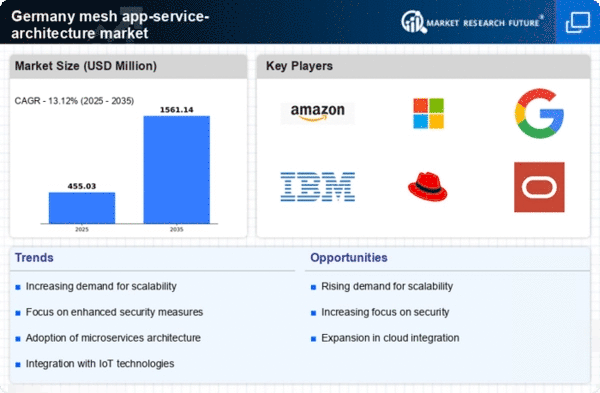Focus on Cost Efficiency
Cost efficiency remains a pivotal driver in the mesh app-service-architecture market in Germany. Organizations are increasingly seeking solutions that not only enhance performance but also reduce operational costs. The ability to optimize resource utilization through mesh architectures is appealing to many businesses. Recent studies indicate that companies adopting these architectures can achieve cost savings of up to 25% in their IT expenditures. This focus on cost efficiency is prompting organizations to evaluate their existing infrastructures and consider transitioning to mesh architectures that offer better resource management and lower maintenance costs. As a result, the market is witnessing a shift towards solutions that balance performance with financial prudence.
Adoption of DevOps Practices
The integration of DevOps practices within the mesh app-service-architecture market is gaining traction in Germany. Organizations are increasingly recognizing the benefits of collaboration between development and operations teams, which enhances the speed and quality of software delivery. Approximately 70% of German companies are now implementing DevOps methodologies to streamline their processes. This shift is fostering a culture of continuous integration and continuous deployment (CI/CD), which is essential for maintaining competitive edge. The mesh architecture supports these practices by allowing for modular development and easier integration of various services, thus facilitating rapid innovation and responsiveness to market demands.
Rising Demand for Scalability
The mesh app-service-architecture market in Germany is experiencing a notable increase in demand for scalable solutions. As businesses expand, they require architectures that can seamlessly accommodate growth without compromising performance. This trend is particularly evident in sectors such as e-commerce and finance, where agility and responsiveness are paramount. According to recent data, approximately 65% of German enterprises are prioritizing scalability in their IT strategies. This shift is driving investments in mesh architectures that facilitate dynamic resource allocation and load balancing, thereby enhancing operational efficiency. The ability to scale applications in real-time is becoming a critical factor for organizations aiming to maintain competitive advantages in a rapidly evolving market landscape.
Emphasis on Enhanced User Experience
In the current landscape, the mesh app-service-architecture market is increasingly focused on delivering superior user experiences. Companies in Germany are recognizing that user satisfaction directly correlates with business success. As a result, there is a growing emphasis on architectures that support responsive and intuitive applications. Data indicates that organizations investing in user experience improvements can see up to a 30% increase in customer retention rates. This trend is prompting businesses to adopt mesh architectures that enable faster deployment of features and updates, ultimately leading to a more engaging user interface. The integration of user feedback into development processes is also becoming a standard practice, further driving the evolution of the market.
Investment in Digital Transformation
Digital transformation initiatives are significantly influencing the mesh app-service-architecture market in Germany. As businesses strive to modernize their operations, there is a marked increase in investments aimed at adopting advanced technologies. Reports suggest that over 50% of German enterprises are allocating substantial budgets towards digital transformation projects, which often include the implementation of mesh architectures. This trend is driven by the need for improved operational efficiency, enhanced data analytics capabilities, and better customer engagement. The mesh architecture provides the flexibility and interoperability required to integrate various digital tools and platforms, thereby supporting comprehensive transformation strategies.
















